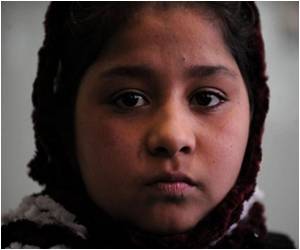Set in stony hills and steeped in traditions, Dah Yaya is an Afghan village that limit women to second-class status in this desperately poor country ravaged by Taliban insurgency.

Just a 40-minute drive from Kabul, the village feels as if it's in the middle of nowhere. The road winds through the arid, dusty hills that encircle the Afghan capital, past mud-brick homes.
Women and girls wear burqas. Only once they are safely behind the gates of the Zabuli Education Center, do school girls take them off and leave them hanging on a banister.
Founded by Razia Jan as part of her battle to educate girls in rural Afghanistan, the school wants to exact change in a country notorious for dreadful women's rights.
"I have 400 girls," says Jan, who founded the school in 2008. Funded by private donors, it offers a free education to pupils.
"We made these girls speak for themselves, so that if something terrible happens in their life and they don't want it, they fight it, they have the force to say no, no, no," she added.
A massive increase in the number of girls going to school since the fall of the repressive Taliban regime in 2001 is touted as one of the biggest achievements of Western intervention in the country.
But poor attendance and absenteeism are major problems. Regular, high-profile cases of abuse, intimidation and violence underscore that for many women in parts of the country, little has changed.
But the Zabuli Education Center provides girls with better than average teaching. Girls learn English as young as four, and they also have access to computers and to the Internet.
Some profess to being fans of US superstar Jennifer Lopez and Canadian heart throb Justin Bieber -- pop singers far beyond the traditional horizons of Afghan culture.
Zuhal Ansaari, 15, is passionate about art and is convinced that one day she can realise her dreams of becoming a teacher.
"Women and men have the same rights," she told AFP.
"If a woman is educated, her role in the family becomes more important, she can teach her children and have a better life, because she knows at least the same thing as her husband."
Nazaneen Jahd, 14, even believes that one day a woman could lead the country if she is properly educated and gets the chance.
"I hope that very soon there will be one," she said.
According to the UN Girls' Education Initiative, the literacy rate for Afghan women aged 15-24 is 18 percent, compared to 50 percent for boys, and only 13 percent of girls complete primary school.
It quotes statistics estimating the mean age of marriage at 17 years while child marriages (where at least one participant is under 18) account for 43 percent of all marriages, which plays a part in the gender gap in education.
"When a girl becomes an adult or a teenager, their parents, especially their father, can force a girl to marry, even with a 65-year-old man," says Nahid Alawi, a teacher at the school.
The school may not be able to interfere in family matters, but its mission is to support those girls who put their foot down.
"I can give her advice: it's not time for her to get married, but unfortunately some families force them to get married," Alawi said.
Rahila Rohullah, in ninth grade, fought with her family for six months when her father tried to beat and threaten her into marrying the father of a woman he wanted to marry himself.
She resisted, finding at school the comfort that allowed her to hold out until her father finally gave up.
"It's my own decision who I will marry, and I wont allow my parents to force me. It's every girl's right," she said.
Mer Ruhullah, the village chief who sends four of his daughters to the school, said attitudes were starting to change and praised the school for changing the lives of girls in the village.
"There is no doubt there are people who don't want such a girls' school in our village. There are also people who don't send their girls to school, but times have changed. People are more open-minded now," he said.
But Jan still fears that one day her efforts could be destroyed if the Taliban return to government in any peace deal after US-led NATO combat troops withdraw next year.
"You cannot trust them, they're murderers," she said.
"When a snake bites you once, you don't go to the den again to get bitten," she said.
Source-AFP
 MEDINDIA
MEDINDIA




 Email
Email






